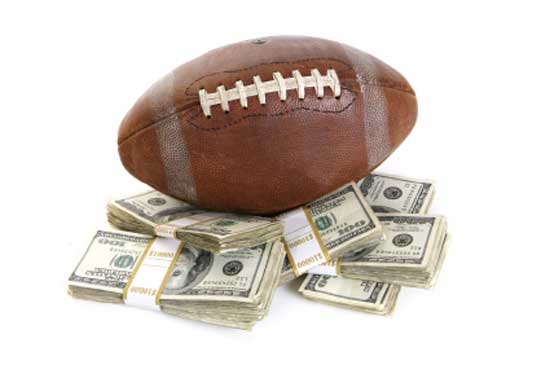I’ve spent the better part of this series poking holes into some of the more popular arguments in regards to paying the players. To recap, the series started with a look at what scholarships actually cover, directly answering the argument of players needing extra cash to live. Then the revenue argument was discussed, examining just how much programs actually make from their athletic endeavors. Finally, the previous installment of this series covered the Olympic model and pointed out, that while a good idea in theory, it fails to address the issue of keeping the student athletes in the classroom.
So what’s my big idea to solve this mess?
To start, we need to stop trying to think of quick “duct tape” methods to fix the problem. The NCAA has quite the large issue on their hands and they have to take a look at how these issues keep on happening. It’s becoming abundantly clear that the NCAA rulebook as it stands needs a complete overhaul. It’s overcomplicated, full of loopholes, and poorly enforced.
Not only that, the NCAA needs to be honest with itself, most of the problems happen in FBS football, a system that they have let run completely out of control. The BCS runs college football, the NCAA just attempts to enforce its rules on top of it. Even if the NCAA swings the sanction hammer, the BCS could very well decide to leave their crowned champion alone for instance. While we talk about out of control boosters giving kids free meals, gifts, and other illegal benefits, all the bowl games turn around and do the exact same thing. That side of the equation just doesn’t quite balance.
Furthermore, unlike other sports, football has no minor league system. Kids from other sports can go pro right out of high school save for football and basketball. For football, the main issue is physical development as 18-19 year old kids simply aren’t physically ready for the demands of the NFL game (and for basketball, a laughable “one and done” rule is now in place, which I would argue is a complete joke and begging for issues–just take a look at O.J. Mayo). Agents and boosters see this “minor league” gap and take advantage of it and the NFL won’t be making a minor league any time soon.
And why would they? They know college football is there for free.
The fact is that the majority of athletes, football players included, know that a free college education is a great deal. There are a select few that want theirs a bit early and are more than happy to cash in from boosters that have them convinced they deserve the world. And of course, there are quite a lot of players that are falling into violation traps that range from “what, that’s actually a violation?” to “seriously, this is absurd”.
To start to truly solve this problem, the NCAA needs to light the current rule book on fire and start over. There is very little doubt about this and you will be hard pressed to find anybody that will disagree.
Before any knew rules are made, the NCAA needs to fix it’s own organization. They have no teeth. If it weren’t for FBI investigations, jilted players, or angry boosters that end up blowing the whistle, the big scandals in college football would not have been uncovered. The compliance offices that are supposed to enforce the NCAA’s rules are a joke in theory and the main reason is because the school’s themselves hire and set them up. The NCAA needs to put their own people in these office and not only that, extend their function to include preemptive investigation. Hire investigative reporters, hell make Chris Robinson your go-to guy if something smells funny if you have to. There is no way the NCAA will ever get out in front of this situations unless they give themselves the power to do so. It is far from a crazy idea, hell a rogue agent actually agrees with me.
Once you have an organization in place that can actually do something, now the NCAA can move on to fix, and more importantly, simplify their rules.
Firstly, the scholarship situation needs to change. There are still some things that scholarships do not completely cover like “recommended books” for courses, which is really the academic equivalent to a football coach opening the weight room for an “optional workout”. There are also inevitably materials that are needed for classes as well: notebooks, lab books, pens, etc. There is no reason that these shouldn’t be covered as well in a scholarship as well. Doing this shouldn’t make athletes any more special than a student on a academic scholarship as well–those students should, in all honesty be extended similar benefits. A school wouldn’t put an athlete on the field without proper equipment, why poorly equip them in the classroom?
The scholarship should also do a better job of ensuring basic living needs are covered and if the NCAA were able to set up their own compliance personnel, housing and food would be very easily managed. All housing arrangements would go directly go through NCAA compliance, allowing them to see exactly how much each athlete’s living costs are, and most importantly, be able to do things like budget out living costs for gas & utilities to a similar level of an on campus student. Furthermore, you can have NCAA compliance actually help the kids budget costs if they live off campus and there should even be some room for exceptions on an occasional basis (seriously, if teams can do an occasional meal, how about an occasional extra tank of gas?). This should completely negate the “starving athlete” argument for good.
Next, its time to redefine what amateur status is. To me, an amateur status means that you do not get paid professionally for the sport you play. So if a kid has a game worn jersey and he wants to sell it, let him. If someone really wants to pay for a kid’s signature, go for it. Somehow, selling a jersey to go get an iPod is illegal, but a bowl game giving a player an iPod directly isn’t. A booster can’t buy a burger for an athlete and a restaurant owner can’t give discounts to players as well, yet the Cotton Bowl hosts an all-you-can-eat prime rib competition at a steak house here in Dallas (tradition!). The NCAA is splitting hairs and wanting to enforce rules that quite frankly, they can’t.
Now, I’m not saying that it should be ok for cash to be handed out to athletes at will. There should always be a trade of goods or work involved in any cash transaction. This should also include any endorsement deal as well. I doubt you will see too many companies dishing out serious money for a kid (risky investment, in my opinion), but if they choose to, a kid should be allowed to capitalize on his market value. Note though, that is a clear distinction of being paid to play as the athlete is being paid for endorsing a project, not actually playing his sport. Yes, they’d be famous because of the sport; however, hairs are again needlessly being split there.
To keep a student athlete in the classroom, all such transactions or endorsements should only be made when they are academically eligible to play. Furthermore, money in these deals should be going to both the school as well as the athlete. The athlete benefits from the school he is affiliated with just as the school benefits by said athlete so money should be going to both entities. Should a player be ineligible, they shouldn’t also be able to benefit off their school as well.
Caps should also be placed on how much a player can make while they are in school. However, an athlete should be able to also make what the market thinks he is worth as well. To split the difference here, the NCAA should institute a cap on endorsements, sales, etc. and anything that is in excess of that cap goes into a trust for the player. Once he goes pro or graduates, he can withdraw that money, but if he is caught getting additional benefits, he forfeits that money to the school. This again, is why it would be so important to have a strong NCAA presence at every school to help enforce such a cap and to ensure funds are going to the proper parties at the proper time.
Everyone benefits from this. The athlete gets a chance to make legitimate money (and has reason to not screw himself out of additional money by breaking rules), the schools can even get yet another piece of the pie as well, and the NCAA can actually focus on larger issues and violations. This also can protect an athlete that say, misses out on a chance to go pro due to injury and thus misses out on cashing in on what value he had.
The other missing piece is that the NFL, NBA, etc need to step in and control their agents. Any agent caught signing a player early or giving benefits to convince a player to sign for them should be fined and suspended with repeat offenders barred from representing any player as an agent. It makes no sense for the schools and athletes that had nothing to do with agent violations suffer. The offenders themselves should be punished and there is no reason that professional agents can’t be held accountable.
Furthermore, NFL has set up some precedence with their recent suspension of Pryor to actually punish a player for violations in college. The NFL should not be a safe-haven for NCAA violators to jump ship (coaches included) when they know things are about to hit the fan. The NFL could always fall back on their “actions unbecoming to the league” punishment that they love to toss around recently. While some people have an issue with this, I don’t. It doesn’t matter to me that the violations and rule breaking happened outside the NFL umbrella, by running off before they were caught, they have given the NFL and the franchise they play for a bad name when they are.
Yes, I realize this part is a tad more of a pipe-dream and a possible CBA nightmare; however, as stated before the NFL is benefiting from college football as their free minor league system and they should work hand in hand with the NCAA to help discourage violations from athletes and agents alike. The fact remains that while small steps can be made to make things better, the NFL and other professional league cooperating with the NCAA is still a major step in making sure that the NCAA rules are given more than lip service.
In the end though, there is no ironclad solution to stop cheating completely. While I and other people can figure out a multitude of ways of trying to eliminate cheating from NCAA athletics, nothing will stop pure greed and devil-may-care attitudes from corrupting the game. Nevin Shapiro was not the first nor will he be the last rogue booster that will decide he can do whatever the hell he wants. Certain athletes will always feel entitled to a bigger piece of the pie no matter how many concessions the NCAA gives them as well. The best outcome that we can hope for is that the NCAA tries to make serious changes in their organization and in their rules. As of now, the NCAA is consistently focusing on the speck of sawdust in everyone else’s eyes while the gigantic log that is their own incompetence and hypocrisy in theirs. The times have changed and the NCAA must change with them; otherwise, the boosters, agents and athletes will continue to run college sports.

